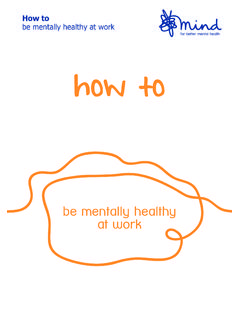Transcription of Resource 4 How to support staff who are ... - Mind
1 Resource 4 how to support staff who are experiencing a mental health 4: how to support staff who are experiencing a mental health problemIntroduction This guide sets out simple, practical and inexpensive steps that any organisation can take to support staff at every stage of the mental health spectrum whether they re stressed or have a diagnosed mental health condition. The approaches in this guide are universal principles designed to support a diverse range of people across a range of workplaces. It looks at:1. How to create a culture that supports staff to be open about their mental health2. How to have a conversation with someone about their mental health 3.
2 How to support someone experiencing a mental health problem4. How to manage an employee s time off sick and their return to workMind is not providing legal advice but practical guidance employers may also need to obtain their own legal advice on the approach to take in any particular case. Having clear policies and approaches for managing mental health helps organisations ensure consistency but in practice this may look different in different workplaces and contexts. For example small businesses may not have formal policies for every situation but they can still develop a clear positive culture and approach on mental health and communicate this clearly to staff .
3 Right now 1 in 6 workers is dealing with a mental health problem such as anxiety, depression or stress. This can stop people performing at their best. Organisations perform better when their staff are healthy, motivated and focused. Smart employers support employees who are experiencing mental health problems to cope and recover. The support people receive from employers is key in determining how well and how quickly they are able to get back to peak by people when they experience a mental health problem is not only about keeping hold of a valuable staff member it also sends a message about your organisation s values. All employees need to see that their organisation lives its values and treats its people well.
4 Trust and integrity are key drivers of engagement and organisations that support staff reap the benefits in terms of loyalty and commitment from all employees. We all have mental health it moves up and down a spectrum from good to poor and it s affected by a range of factors both in and outside of work. Starting a conversation about it doesn t have to be difficult we can show you how to effectively support your staff and increase employee engagement, motivation and productivity. 3 Resource 4: how to support staff who are experiencing a mental health problem1. How to create a culture that supports staff to be open about their mental healthIf you take proactive steps to create a more open and supportive culture, over time staff should begin to feel more confident to talk to managers about their mental health.
5 However, it s important to remember culture change doesn t happen overnight and the individual relationships between managers and employees are the key to getting this right. If people are able to receive support quickly, this can often help steer them away from developing a more serious problem. For this reason, it s vital that organisations have clear, well publicised channels in place for employees to raise concerns and take positive action promptly when staff seek previous guide highlighted key manager behaviours that help create the right culture and space for staff to be open and seek support . Managers need to be approachable and confident about mental health and should take steps to normalise conversations about mental health and encourage open dialogue.
6 Regular one-to-one meetings and catch-ups are a great place to ask your staff how they re getting on and doing so regularly will help build trust and give employees a chance to raise problems at an early stage. Too often employees are scared to tell their manager about a mental health problem and so problems can spiral. A recent survey revealed that one in five people felt they couldn t tell their boss if they were overly stressed at work and less than half of people diagnosed with a mental health problem had told their Organisations need to send a clear signal to staff that their mental health matters and being open about it will lead to support , not discrimination.
7 A simple way to communicate this is to explain that mental health will be treated in the same way as physical health. Organisations can back this commitment up with a clear mental health strategy and specific policies to ensure employees experiencing mental health problems get the support they need straight away. Our previous guide, How to promote wellbeing and tackle the causes of work-related mental health problems, sets out simple, practical and inexpensive steps to help you improve mental wellbeing for all staff , tackle the causes of mental health problems and boost employee engagement. 1. Populus poll for mind of 2,060 adults in England and Wales in employment polled between 6 and 10 March 2013 4 Resource 4: how to support staff who are experiencing a mental health problem2.
8 How to have a conversation with someone about their mental health It needn t be awkward or difficult just as you would with physical health a good place to start is simply to ask someone how they re doing. The first step is to establish open communication (which should be maintained if people take time off for sickness absence) leading to understanding and appropriate support . How do I know if someone s experiencing a mental health problem?You know the people in your team and you may notice changes in them. However, it s important to remember everyone s experience of a mental health problem is different and there may be no outward sign this is why it s so important to create an environment where people can be open.
9 You should never make assumptions about people s mental health but clues might include: changes in people s behaviour or mood or how they interact with colleagues changes in their work output, motivation levels and focus struggling to make decisions, get organised and find solutions to problems appearing tired, anxious or withdrawn and losing interest in activities and tasks they previously enjoyed changes in eating habits, appetite and increased smoking and drinking. Work is the most stressful factor in people s lives2 but often people don t feel able to ask for help when they re struggling. This silence feeds misunderstanding and prejudice which can make it harder for people to be open.
10 This is why it s vital that managers routinely ask staff how they re doing and discuss their mental health it helps build up people s confidence to speak up earlier on and get the help they need sooner. Sometimes people can worry about how to approach a conversation about a person s mental health but there are no special skills needed just the ones you use every day as a people manager like common sense, empathy, being approachable and listening. If you do nothing, problems can spiral, with a negative impact for individuals and organisations. If you think a member of your team may be experiencing a mental health problem, you may need to take the lead and raise this with them, as people often don t feel able to bring it up themselves.















